
Back جبال ودانج ARZ Montes Wudang AST Уданшань Byelorussian Комплекс от древни сгради в планините Удан Bulgarian Muntanyes de Wudang Catalan Удан CE Wudang Shan (bukid) CEB Wu-tang Czech Wudangbjergene Danish Wudang Shan German
| UNESCO World Heritage Site | |
|---|---|
 | |
| Location | Hubei, China |
| Criteria | Cultural: i, ii, vi |
| Reference | 705 |
| Inscription | 1994 (18th Session) |
| Coordinates | 32°24′03″N 111°00′14″E / 32.400833°N 111.003889°E |
| Wudang Mountains | |||||||||||||||||||||||||
|---|---|---|---|---|---|---|---|---|---|---|---|---|---|---|---|---|---|---|---|---|---|---|---|---|---|
 "Wudang Mountains" in Simplified (top) and Traditional (bottom) Chinese | |||||||||||||||||||||||||
| Traditional Chinese | 武當山 | ||||||||||||||||||||||||
| Simplified Chinese | 武当山 | ||||||||||||||||||||||||
| |||||||||||||||||||||||||
The Wudang Mountains (simplified Chinese: 武当山; traditional Chinese: 武當山; pinyin: Wǔdāng Shān) are a mountain range in the northwestern part of Hubei, China. They are home to a famous complex of Taoist temples and monasteries associated with the Lord of the North, Xuantian Shangdi. The Wudang Mountains are renowned for the practice of tai chi and Taoism as the Taoist counterpart to the Shaolin Monastery,[1] which is affiliated with Chan Buddhism. The Wudang Mountains are one of the "Four Sacred Mountains of Taoism" in China, an important destination for Taoist pilgrimages. The monasteries such as the Wudang Garden[1] were made a UNESCO World Heritage Site in 1994 because of their religious significance and architectural achievement.[2]
